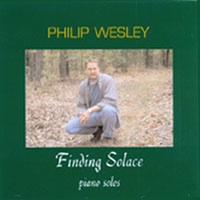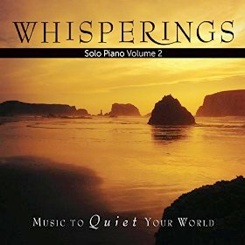
Finding Solace
Philip Wesley
2003 / Autumn Music Productions
44 minutes
Review by Michael Debbage
For those of you that found David Lanz's latest release The Good Life just a little too flamboyant in the jazz arena, you will be delighted to know that an up-and-coming artist by the name of Philip Wesley is your ticket to pure solace. Referring to himself as a Music Therapist, there is no doubting the relaxing benefits from this impressive debut.
Born and raised in the St. Louis area, Philip Wesley's introduction to music came courtesy of his guitar exploration and, of all things, the "poodle" bands of the eighties. His introduction to the piano and the music of David Lanz and Yanni changed all that. Since then Wesley has refused to look back and has continued to refine his craft that has resulted in this precious and precise debut. It certainly has an early Narada artist sound most closely associated to David Lanz. Frankly Wesley relishes in the comparisons of which he refers to as the master. But this does not take away from Philip's gorgeous melodies and delicate touch of the keys.
Though Wesley has recently signed a non-exclusive agreement with Universal Records, currently the album has an independent presentation. The artwork and CD booklet is very limited, however it would be a huge mistake to judge this "book" by its cover. The music is very well produced and is presented by the artist as though he was an old pro that had been doing this for years. If you enjoyed the early years of David Lanz then without hesitation you will find Wesley's technique tender.
It would be safe to state that this freshman offering has no filler or middling compositions. And this is despite the lack of accompaniment from any other instrumentation: just the piano and the piano man. The opening track "At This Moment" is one of the album's finer moments with probably the most distinctive melody of all the tracks. A close second would be the delightful "Love's Last Embrace". Here the song structures have more in common with the accessible Jim Brickman than David Lanz.
Equally as impressive is the more subdued yet illustrious aperture of "Autumn Romance". With Wesley gently rolling down his keys, one can only imagine golden and brown leaves dancing and fluttering as they fall gently to the damp ground of the season. Here he gives such a visual word picture with his music.
Philip continues on with the meandering melancholy of the more classically influenced "Lamentations Of The Heart". It is here that the Lanz comparisons are the most obvious. It also appears that Wesley is at his inconspicuous best at the conclusion of the album courtesy of the spacious "The Long Goodbye". There are many quiet and unassuming moments within the song, allowing the listener to breathe and deeply inhale this sweet lullaby. A great way to quietly wrap up this very fine debut.
The New Age genre, especially at this acoustic level, is a dying genre. Many record stores are combining the New Age stock with the jazz, or worse tucking them next to the specialized sections like comedy (and this is no laughing matter). Thus, I have only good things to say about Wesley writing from his heart. Finding Solace is a total relief and brings water to a world that is thirsty for consolation and comfort. Whether I buy into Philip Wesley as an actual Music Therapist is not the point. But what I do buy into is the rewarding and entertaining therapeutic values from this unobtrusive yet astonishing music.
June 29, 2004

2014
(contributing artist)

